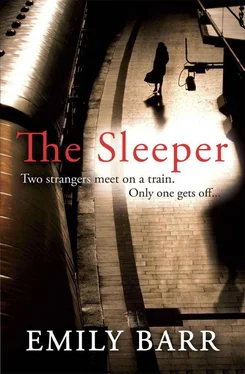‘You realise the chances of her being OK are negligible?’
‘Don’t say that!’
‘You won’t leave me, Iris? I wouldn’t know what to do. I’d be nothing without you.’
I took a chip from his plate even though I still had plenty on my own, just to show how together we were.
‘I’ll never leave you,’ I said. ‘This is the life we’ve chosen. This is our life. It’s all I want.’
I looked into his warm eyes, and he looked back at me, radiating love. I pushed my treacherous daydreams so deep inside myself that I knew he would not see them. I was stifled, but secure. This, I tried to tell myself, would do. Security was enough. Desdemona climbed on to my lap. I started to push her off and then let her stay.
‘I’ll clear up,’ I said. ‘I love you, by the way.’
‘I love you more,’ he retorted, and I wondered, not for the first time, whether he might be right.
chapter sixteen
February
Guy Thomas’s house was in the wide-open countryside beyond Penzance. I had to take my bike on the train and then cycle up and down hills for half an hour before I reached it. Although I always felt that Falmouth was in the far west, I now remembered that it was not. There were miles and miles between where we lived and the real west Cornwall.
Here the land was rocky, and the light was different. It was almost ethereal. Here, I knew that I was on the very edge of a continent, on the rocks that stood up from the vast bed of the Atlantic. The air was fresh because there were no cities after Truro, which was many miles to the east. There was Penzance, and there were villages.
The Thomas residence was a solid stone farmhouse outside St Buryan, which itself was not far from Sennen and Land’s End. It felt like the end of the world, in a transformative way filled with possibilities. Angels could have glided down from the sky and landed on the road in front of me. Bushes could have burst into flames.
The outside broadcast van parked in the entrance to a field was the first incongruous thing. Then there were cars, half in ditches, all the way up the narrow lane. The gate to what was clearly the Thomases’ house was padlocked, and the crowd of journalists hung over it, chatting, callously casual. Their breath huffed out into the air, making little clouds, and they were stamping their feet and texting and looking both bored and surprisingly young. I had somehow imagined grizzled old Fleet Street hacks, but these rosy-cheeked teenagers looked as if they were on work experience.
I barged straight through them and climbed over the gate. Everyone rushed towards me, and they took photos, just in case, when I was halfway over and looking the most inelegant I could possibly have looked. I would have taken my photo if I had been them: I was, however you looked at it, an unlikely visitor to the grieving widow. They had no idea.
‘Hello, are you a friend of the family?’ said a nice-looking young man. ‘How is Diana doing?’
‘How are the children?’ said someone else.
‘Sorry.’ I felt I had to say something. After that, though, I could not think of anything, so I walked up the drive, past two cars (one small and red, the other huge and black, a four-by-four kind of thing), and pretended I couldn’t hear them.
Everything had changed with the police’s confirmation that Lara had been on the train when it left London, and that she had undeniably been having an affair with Guy Thomas, to the extent that their relationship had spilled over into their London existence and they had both effectively been living double lives. Everybody on the sleeper train knew about them. The staff used to take them breakfast together in the mornings, knowing that, apparently, they would often have pulled down a top bunk so they could spend the night in the same cabin. According to the papers, the beds were not wide enough even for the most star-crossed of lovers actually to sleep together. And now Guy was dead, and Lara was still missing, and, as Sam had swiftly been eliminated as a suspect, everyone had made the grotesque leap to assuming that Lara had killed Guy Thomas (probably by accident, it was generally agreed, after a fight about whether or not he would leave his wife) and run away.
Guy Thomas’s wife, Diana, had discovered first that her husband had been murdered, and then that he’d been wholeheartedly cheating on her. She had the press outside her house, focused on the next day’s headlines. Her husband’s sex life was all over the press and television: the world could not get enough of it. I could not begin to imagine what was happening inside her head.
I was intensely curious about her, and desperate to meet her, and when Sam asked me if I would go to visit her and convey his sorrow and confusion, since he could not bear to leave the house himself, I had leapt at the chance. I made my request through Alexander Zielowski of the Falmouth police, and Diana Thomas had agreed at once.
It might be masochistic , she had written in her email, but I feel I would like to hear about Lara from someone who knew her, rather than from the press, which I am attempting, unsuccessfully, to avoid. Why not? Come along. Nothing else can go wrong.
Lara’s disappearance was as mysterious as it had ever been, but the shock faded and her vanishing was now stony reality. A week had passed, it was Saturday again, and very little had changed. The investigation, which was now called Operation Aquarius, was being run from Penzance police station, under the direction of a Major Crime Investigation Team, which, according to Alex Zielowski, was a specialist detective team. Much as he wanted to be, DC Zielowski was not a part of the investigation.
Laurie and I discussed it endlessly, but we just went around in circles, and the theorising was becoming stale. According to the police and the excited press, Lara had gone to bed early after keeling over (this, speculation had it, was to give herself the alibi of being tucked up in bed). However, she was soon back on her feet: another passenger had seen her at around half past midnight, heading towards Guy’s cabin. In the morning she was gone, and Guy was dead, killed by a small but sharp knife that had Lara’s fingerprints on it. Passengers in the cabins on either side reported hearing voices, but not raised ones, and a scuffle, but nothing dramatic enough to make them feel, at the time, anything other than annoyed at being disturbed.
Every passenger in the sleeper part of the train had been traced. It was easy, because everyone who travelled in the sleeper carriages was listed and ticked off by the attendants, like on an old-fashioned train. There was, however, a second section, which sleeper passengers called ‘cattle class’, where people sat in a chair all night. I trusted Alex when he told me that he was almost completely sure that none of the sleeper passengers had been involved in the murder, so I was certain that the killer must have been travelling on the ‘cattle’ part of the train, and must have left it long before the train reached its terminus
Nobody else seemed to think that, at all. Once it was not Sam, the entire world had decided it was Lara.
The police were checking the ground along the train’s route, but that covered many miles and I thought they were mainly looking for her body, working on the basis that she had flung herself from the train after accidentally stabbing her lover to death. The papers preferred more exciting storylines: she had melted away and could be anywhere. She could be right next to you now! their excitable chatter pointed out. As you’re reading this! On the bus! Keep an eye out, everyone! It was like when a child was missing, except that instead of the innocent angel, the entire country was scanning the faces on every street searching for a beautiful yet depraved murderer. It was very exciting entertainment for people who didn’t consider any actor in a drama like this to be a human being.
Читать дальше










